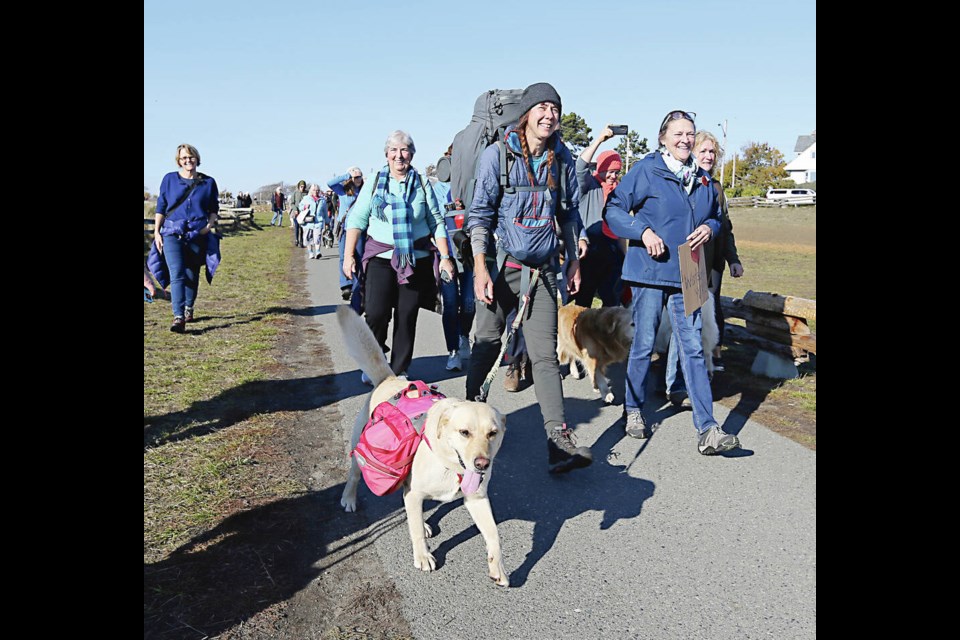Under blue skies and a bright sun, Melanie Vogel took off her battered hiking boots and did a little dance in the Pacific Ocean.
A crowd of about 200 gathered at Clover Point erupted into applause, with cheers of “well done” and “congratulations” as Vogel splashed salt water on her adopted dog and companion, Malo, and threw her hands in the air.
It was a remarkable moment for the German-born Vogel, 47, a solo hiker who went down in history as the first woman to walk the Trans Canada Trail from coast to coast to coast — the Atlantic, Arctic and — with a rush of astonishment and her own disbelief — the flat-as-glass Pacific on a warm Saturday afternoon.
The 20,000-kilometre journey took Vogel five years and five months, an estimated 26 million steps and 15 pairs of hiking boots. It brought her in contact with hundreds Canadians who provided shelter, food, donations and plenty of encouragement along the way.
Vogel, a landed immigrant since 2008, called it “a solo walk powered by human kindness.”
A layover in the Yukon because of pandemic travel restrictions lasted 18 months, and stretched the trek longer than Vogel expected, but she took it all in stride and saw the country in four seasons multiple times over, all sorts of weather and in wilderness and urban settings.
Malo, a yellow Labrador-husky cross, was adopted in Manitoba and her travelling companion for three years.
Vogel said she felt “deeply connected” with Canada’s vast tracts of nature — old-growth forests, snow-swept plains, tundra and rushing rivers — but was struck most by the people.
Vogel lived in a tent during most of her journey, but also stayed in Canadian homes. She said Canadians stepped up when support was needed: the repair of gear; someone built her a wagon to carry her 60-pound pack; invitations into homes; a sandwich handed through a car window; encouragement online or sometimes a simple hug or high-five on the roadside.
“Those moments and the stories we shared have shown me the true soul and spirit of this country,” said Vogel. “Strangers become friends. People open their hearts and open their homes … on such a long journey, you can’t do it all alone. It’s impossible.
“The people make a country. This is how you get to know the country even better by meeting them along the way.”
Vogel, who has spent a career working in non-profit organizations, said she financed the trip through her own savings, donations from Canadians and others, living a minimal lifestyle and a 2019 Women’s Expedition Grant from the Royal Canadian Geographical Society.
She is considering becoming a Canadian citizen and feels well prepared with the knowledge she’s gained walking through every province and territory.
“I came to this country to stay for two years,” said Vogel. “Now I’ve fallen in love with this country.”
Vogel hopes to inspire others to live a more eco-friendly and sustainable lifestyle with minimal impact on the environment, and she is particularly passionate about encouraging women and young girls to have the courage to explore and learn.
“There exists a barrier for women to explore the outdoors on their own,” said Vogel, who chronicled her trek on social media.
“I wanted to be someone women and young girls can relate to — a city girl who set out on an adventure to reconnect with nature. I shared my experiences and emotions honestly and I talked openly about my failures and what I learnt from them, and shared moments of fears, and how fear finally moved to the back of my mind the more time I spent in nature.”
She added: “Nature invites you to push past your comfort zone, and it made me happy when I received messages from women who felt encouraged by my walk to push theirs a little further.”
Vogel’s trek on foot comes after B.C. filmmaker Dianne Whelan who in August 2021 became the first person to complete both the land and water routes of the Trans Canada Trail.
In 2017, Edmonton’s Sarah Jackson completed an east-to-west journey.
The Trans Canada Trail, marking its 30th anniversary this year, is the longest recreational pathway in the world, spanning 28,000 kilometres on land and water and linking 15,000 rural, urban and Indigenous communities in every province and territory.
Vogel said she was speaking with Whelan this week. “I said it feels so good to have done something so big that also has such a good meaning behind it,” said Vogel. From the feedback on her social media, she said “so many people felt inspired in their everyday life by me just walking across the country.”
Now that her long trek is ending, Vogel said she’s feeling overwhelmed, excited and anxious all at the same time.
“I’ve started telling myself that even though the trail ends the journey has not,” she said. “What gives me the peace and strength to move forward is the thought that this or any other trail will be there for me when I need to step out, sort my thoughts and take a few deep breaths. That thought is comforting.”
Her family in Germany — parents Rita and Frank and a sister and brother — sent Vogel a shirt she wore at the finish line Saturday. It had pictures of all of them, including a sister in law and children she hasn’t even met yet, with the message in German that translated to “The last steps we walk together.”
A rush of donations this month will allow Vogel to return to Germany to see everyone for Christmas.
>>> To comment on this article, write a letter to the editor: [email protected]



